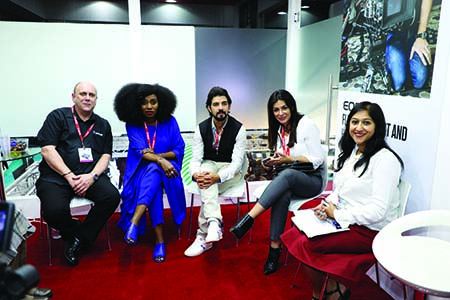The African filmmakers' panel hosted by Canon at CABSAT and moderated by Vijaya Cherian, Editor of BroadcastPro ME, painted a complex but promising picture for the continent.
 African reel success since the early 2000s has been the story of its most populous country, Nigeria. At a recent panel on African filmmaking, hosted by Canon at its CABSAT stand, moderator and Editor of BroadcastPro ME, Vijaya Cherian, acknowledged this extraordinary phenomenon while also welcoming the three panellists and well known influencers from the African continent Nigerian photographer, singer and songwriter Toyin Sokefun-Bello, popularly called TY Bello; Moroccan actor Omar Lutfi, star of Remembering Adil, Casanegra, Djinns and other films; and Egyptian actress Injy El Mokadem, best-known for her roles in Al Meadeya (2013), Underground (2013) and Roundtrip (2015). Paul Atkinson, Product Specialist at Canon Europe for professional video and cinema EOS cameras, also joined the panel.
African reel success since the early 2000s has been the story of its most populous country, Nigeria. At a recent panel on African filmmaking, hosted by Canon at its CABSAT stand, moderator and Editor of BroadcastPro ME, Vijaya Cherian, acknowledged this extraordinary phenomenon while also welcoming the three panellists and well known influencers from the African continent Nigerian photographer, singer and songwriter Toyin Sokefun-Bello, popularly called TY Bello; Moroccan actor Omar Lutfi, star of Remembering Adil, Casanegra, Djinns and other films; and Egyptian actress Injy El Mokadem, best-known for her roles in Al Meadeya (2013), Underground (2013) and Roundtrip (2015). Paul Atkinson, Product Specialist at Canon Europe for professional video and cinema EOS cameras, also joined the panel.
Nollywood is a $3.3 billion industry with 1,844 movies produced in 2013 alone. It has evolved into the biggest employer in the country, providing more than one million jobs; and as of March 2017, the industry produces an incredible 80 movies a week. How did this amazing growth come about, and what influence do Nigerian films have on the rest of Africa? Cherian asked TY Bello.

The Nigerian film industry is very exciting, she agreed. As a nation, we are beginning to pay more attention to our industry and realising that the creative content we send out has a lot of impact on many other spheres. When you travel across Africa, you will find that people are more in touch with Nigerian music and, to some extent, our films and productions. They seem to know our actors and actresses, and can identify with our stories.
The Nollywood phenomenon is not restricted to Africa. Along with the African diaspora, the films are popular in the Caribbean as well. What is exciting is that the industry has evolved and with the change in technology, it is nice to see younger filmmakers coming to the industry with more modern stories, showing the world what it is to be a young Nigerian living in 2018.
It is amazing to see our culture celebrated in our movies, but I would love to see our movies travel to more African countries and to the Arab world.
I would love to see a more united Africa. If we could take advantage of the sheer numbers of Africans and consume our own content, our film industries would thrive Toyin Sokefun-Bello, photographer, singer, Nigeria
Bello referred to The Wedding Party, a comedy based on Nigerian wedding culture. This was the highest grossing Nigerian movie in 2017, the first to surpass the $1.3 million mark, and film critics believe the current crop of Nigerian movies is a step up from those of the past, replete with haphazard writing and trifling plotlines.
On a continent shaped by a colonial past, Nollywood, according to Bello, is redefining the African experience by telling stories that people of the continent can readily identify with.
I believe our movies are about everyday circumstances and our culture, including family, government and about young people striving for success.
A veteran of many Egyptian movies and dramas, actress Injy El Mokadem agreed that content is one of the key drivers of success while also ruing Egypts fall from grace as the Hollywood of the Orient.

In Egypt, movies are a sort of universal language that bring people together. Previously, the topics dealt in Egyptian movies were related to culture, family, history and politics, and everything that is current. Egypt used to be a very big source for scripts and movies that had an impact not only in Egypt but across the world. After the revolution in Egypt, however, the quality of movies has started to go down and this is because of poor scripts. The film industry used to be the second largest contributor to the countrys GDP after cotton. We are recovering slowly though, with more impactful scripts.
Many observers of the Egyptian film industry have attested to the stagnation since the 2011 revolution. From shifting tastes to financial shortages, the unanimous opinion is that the oldest and most competitive cinema industry in the MENA is a shadow of what it once was.
In contrast, the film industry in Morocco has attempted to benefit from some atypical advantages. The Moroccan town of Ouarzazate boasts some of the worlds biggest studios. In 2016, the country earned an estimated $46 million from foreign film and television productions. Despite this international attention, up to a decade ago the Moroccan film industry was not in a good state.
But production has increased since then, with about 15 films produced each year. Local films are being funded by the revenues Morocco receives from foreign productions filmed in the country. In addition, the revamped Moroccan Cinema Centre has been helping with funds and useful legislation.

Moroccan actor Omar Lutfi, who received rave reviews for the 2009 movie CasaNegra about the Moroccan underworld, is more circumspect about the modest progress achieved.
I firmly believe that as much as it is important to have strong narratives, it is also important to make commercial movies because this is where revenues are generated. We need governments and filmmakers to collaborate both in the making and marketing of a film. We can then have movies that dont just have strong narratives but are also commercially viable, and that in turn will drive more production.Another trend the panellists discussed was the focus on producing drama series for the Ramadan period. While this has given the industry a big revenue boost, it has also led to churning out countless substandard productions that suffer in terms of both content and quality.
Highlighting the lopsided nature of investment in television, Mokadem commented: In Egypt and Morocco, the TV standards in production are trying to rise to the level of cinema production. Preparations for Ramadan productions begin a year in advance. In addition to heavy investments in equipment, actors move from the cinema industry to TV, as do crew members and other support staff.
I firmly believe that as much as it is important to have strong narratives, it is also important to make commercial movies because this is where revenues are generated. We need governments and filmmakers to collaborate both in the making and marketing of a film Omar lutfi, actor, Morocco
While North African markets, like the Middle East, grapple with the peculiar commercial challenges posed by Ramadan, Nigerias film industry becoming the second largest in the world is as much a story of accessible technology as of entrepreneurial filmmakers, Bello stressed.
The Nigerian film industry is huge, coming only behind Bollywood. The future of the industry has come, and this is because young creatives are picking up cameras and making films. A decade ago, if you needed to make a film, you would have to film high-quality on celluloid or shoot videos. There were only two options high-quality or low-quality.
Around the year 2002, there was no fancy Nollywood. The movies were simply known as Nigerias home videos. Nollywood is now available on satellite and cable television channels, as well as on streaming services like iRokoTV. While most films have budgets of about $25,000 and are shot in a week, Nollywood now boasts a growing number of films on international platforms such as Netflix.
Asked to name one of the key drivers that helped transform Nigerias film industry, Bello discussed the entry of DSLRs, which revolutionised filmmaking and made it possible for younger people to make movies and tell different stories. At the same time, she said the country has only seen the tip of the iceberg, because of the continued lack of reach of the movies.
The platforms where this content is seen have completely exploded. Social media and YouTube have allowed people to tell stories outside of traditional platforms like the cinema screen. People are shooting short films and music videos. Nigerian music videos are seen across the world with millions of views. I think more than anything, the growth of the industry will have to do more with inclusion. Africa is a very huge market. Already Sub-Saharan Africa consumes its own content.
There is no African content in Egypt. The only other content that is consumed is perhaps content from Bollywood and Hollywood. Despite our shared culture … it is disappointing that within the African continent … there isnt much in terms of collaboration Injy El Mokadem, actress, Egypt
Turning to fellow panellists Mokadem and Lutfi, Bello said: I would like to see more of your movies in our cinemas and more of our movies in your cinemas. We need collaboration. If we are able to see stars from your countries in our movies and you are able to see what life is like for a Nigerian living in Egypt, stories will begin to come together. I think this will create a stronger pool of audience and also help in terms of monetisation of our content. I think collaboration should be the future.
On the ground, the burden of collaboration within the continent is being borne by niche festivals such as the Luxor Africa Film Festival. Initiated in 2012 by Egyptian writer Sayed Fouad El-Gennary, the festival is a platform for African films that would not otherwise be screened in Egypt. Apart from the sterilised and slightly elitist confines of film festivals, Mokadem pointed out that pan-African collaboration is almost non-existent.
There is no African content in Egypt. The only other content that is consumed is perhaps content from Bollywood and Hollywood, apart from series streamed on Netflix. Despite our shared culture and the common language of movies, it is really disappointing that within the African continent, nothing is being shared. Its also very disappointing that within the Arab region itself, there isnt much in terms of collaboration.
While industry stakeholders from Zimbabwe, Nigeria and Ghana, among other countries, collaborate regularly, the long-term viability of African movies also hinges on cinema infrastructure and copyright enforcement.
The Nigerian film industry loses an estimated $2 billion to piracy each year. As reported in Newsweek in 2015, popular Nigerian actor and award-winning producer Kunle Afolayan was notified that his classic film October 1 had been pirated and was already being sold on Lagos streets at $3 per copy. The film had yet to recoup the $2 million invested in its production.
Although Nigeria and Egypt and other countries have laws against piracy, it remains a thriving business partly due to poor implementation of copyright laws, almost no prosecution of offenders, and corruption in governance agencies.
The other hurdle is logistical: a dearth of cinema halls. A large country such as Egypt has about 500 cinemas, mostly in Cairo and large cities. In Morocco, the number is more appalling at under 50 theatres for a population of 30 million. Moroccan films reportedly perform well at the local box office, consistently recording five out of the top ten films each year, but they are critically dependent on the surviving local cinemas.
Lutfi says films have largely received visibility in most parts of Moroccco partly due to the internet, but unfortunately most are watched on pirate platforms.
The internet has helped give people access to movies from all over the world. It has been the only way to reach people in different parts of our country where cinema theatres are almost non-existent.

Paul Atkinson, Product Specialist at Canon Europe for professional video and cinema EOS cameras, part of the panel discussion, offered his view on the state of technology in Africa.
From my limited experience of the African continent, although theres no denying the amount and quality of content in this region, the problem always seems to be that technology is still a fair bit behind. Today, people are able to film videos with a 5D Mark II. In some countries, the 5D Mark III is used as a primary camera. From a Canon perspective, we are able to put a product into just about every budget.
We have the Canon Academy, which has been running quite successfully in a few African countries. I was in Ghana 18 months ago running a small film workshop teaching the basics in the craft of filmmaking.
Cherian then asked the young influencers from Egypt, Morocco and Nigeria what their dreams were for the film industry in their countries and the continent as a whole.
Mokadem said she hoped Egypt would one day regain its title as the Hollywood of the Orient.
I wish artists would be able to have a big impact the way they used to. I have very high aspirations for the country. I not only wish for collaboration between Egypt and African countries, but I want the rest of the world to connect with Egypt through our cinema.
Dreaming of a more sustainable future, Lutfi said: I really hope, in the coming years, Morocco focuses its efforts on building cinema halls because the market is there, the movies are there, but unless we are able to commercialise it and monetise it with screenings in cinemas, we wont be able to move forward. There are big provinces within the country where movies are even shot and produced, but these cities dont have cinemas, and as a filmmaker and Moroccan, its very disappointing. It is a huge challenge but a very reasonable demand on our part to be seeking cinemas in Morocco.
With the radical dream of converting piracy to a legitimate platform, Bello said: My dream for Nigeria would be to see more success in the sense that we are able to convert all the monsters against filmmaking. Piracy has great distribution channels, and it would be nice to see those channels transformed and legitimised for the benefit of the filmmaker. We are trying to kill piracy, but we should be able to tweak it and turn it around so that the channels which are enemies of filmmaking are turned around. I would love to see more cinemas in more cities too.
And lastly, the expressive Bello concluded with a fitting end to a lively panel discussion.
I would love to see a more united Africa. If we could take advantage of the sheer numbers of Africans and consume our own content, our film industries would thrive.















































































